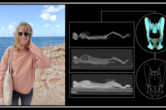Fully-funded PhD opportunity at Masaryk University (Brno, Czech Republic) studying parasite infection and host behavioral organization
Check out a new PhD opportunity co-supervised by Dr. Andrew MacIntosh of CICASP. The project involves observation and behavior recording of wild gorillas in Africa and rodents in the laboratory, and will attempt to determine variation in behavioral organization in relation to infection by various parasitic organisms.
Complexity in Behavioral Organization
a novel approach to clinical outcomes of parasitic diseases
Supervisor
Dr. Klara Petrzelkova at the Institute of Vertebrate Biology
(co-supervised by Dr. David Modry at the Institute of Parasitology and Dr. Andrew MacIntosh of CICASP)
Project Summary (as seen on the Masaryk University website)
Among the non-invasive tools used in the evaluation of animal health includes behavioral monitoring because various stressors can manifest in particular behavioral phenotypes. Clinical signs of health impairment can be rare or difficult to observe in the wild. However, novel analytical tools that are capable of measuring complexity in behavioral sequences, such as fractal analyses, have recently been applied to detect subtle variations in observed behavior. Various studies have used this approach as an objective behavioral measure to distinguish animals in pathological states. Thus, the PhD student will explore possible clinical outcomes of gastrointestinal parasite infections through analysis of behavioral organization, e.g. the sequential distribution of activities across time, focusing on fractal analysis, with the prediction that increasing intensity of infection should lead to reduction in the complexity of host behavior. We will focus on (i) strongylid infections in wild western lowland gorillas and (ii) selected protist infections in laboratory rodents. Using animal focal sampling, the student will record the onset and end of all behavioral sequences in wild habituated gorillas. A complementary laboratory component will include analysis of the behavior of rodents collected via automated video data recorders in their enclosures. Fecal samples will be analyzed using standard coproscopic methods and coupled with parasite quantification. Analysis of behavioral organization will be conducted using various contributed packages in R, as well as other software platforms. Subsequently, several generalized linear mixed models will be developed to examine coefficients of behavioral organization in relation to parasite infection, while controlling for various other factors. We are seeking a motivated student with a fair statistical or otherwise mathematical/behavioral modeling background and at least basic knowledge in parasitology. No previous experience with primates requested.











